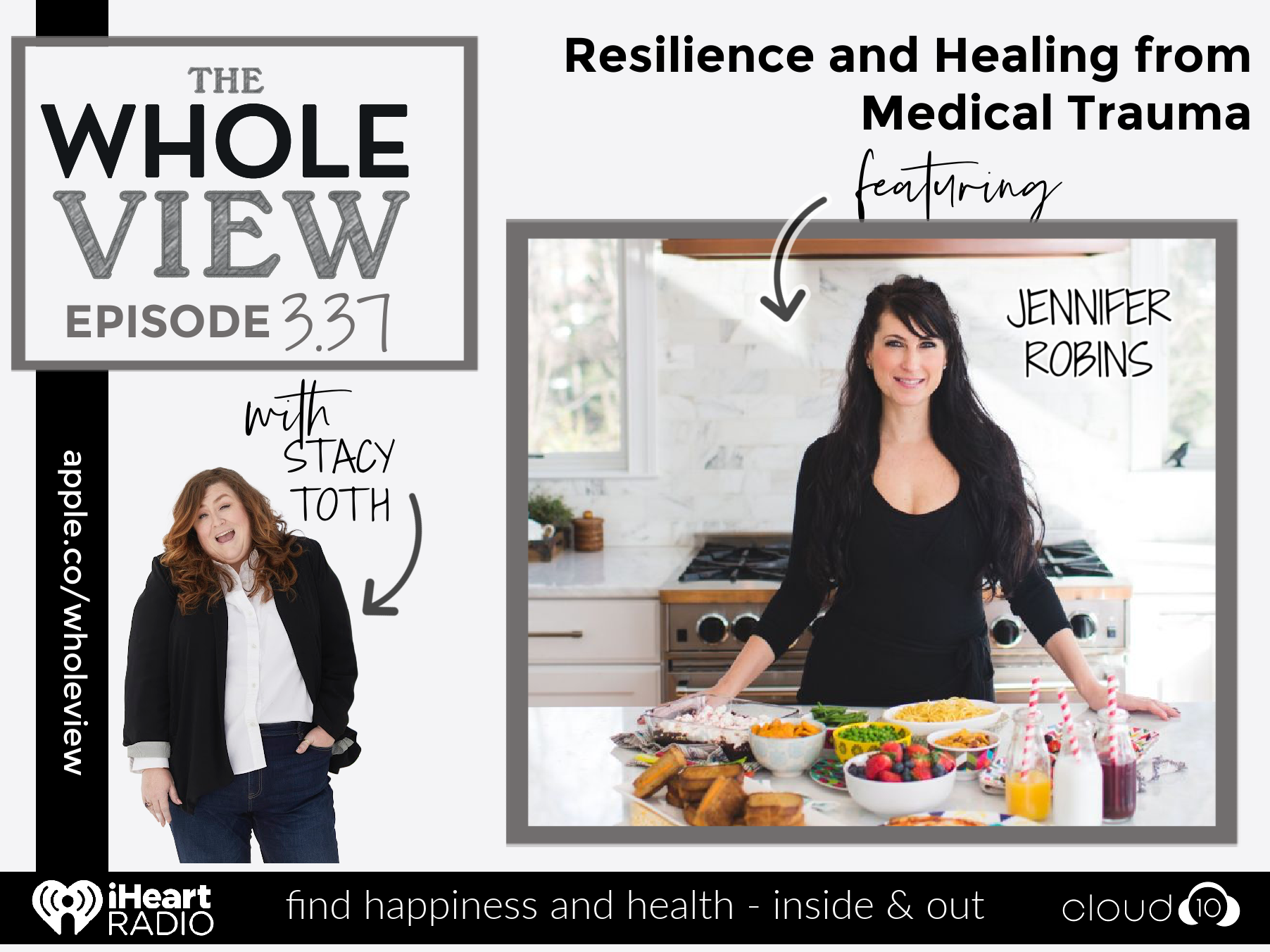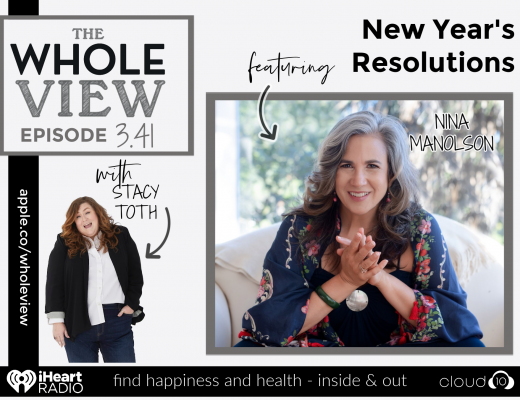Welcome Jennifer Robins back to the Whole View! This week, Stacy and Jennifer discuss resilience and healing from medical trauma. Jen shares her life-long health battle, the toll invisible illness took on her mental health, and how she managed to overcome the struggle.

Find Jennifer:
- Predominatly Paleo – Website & Instagram
- Esther and Loretta – Website & Instagram
- Legit Bread Company – Website & Instagram
If you enjoy the show, please leave a review. Letting people know on iTunes or however you listen that it’s worth their time could change someone’s life!

Key Takeaways
Introductions
- Jen of Predominantly Paleo is no newbie to the show. She is Stacy’s personal mentor, friend, and guru on numerous health-related topics.
- She was on earlier this season to discuss Dynamic Neutral Retraining System (DNRS). With DNRS, Stacy has seen a close friend be able to open up her life in new and wonderful ways, from flying for the first time in years to going to the dentist and doctor visits after years of avoiding them.
- Jen has received over 20 different diagnoses from a variety of healthcare specialists. But ultimately, between food choices, pregnancies, and life stresses, her body finally gave up; however, she found strength where her body found weakness.
Resilience and Healing from Medical Trauma
- Medical trauma is emotional and physical responses to pain, injury, serious illness, medical procedures and frightening treatment experiences. [source]
- Medical traumas are psychological traumas that result from medical diagnosis and/or medical intervention. Threat of serious injury or threat to life due to illness is now encompassed within the DSM definition of psychological trauma, meaning medical patients can have illness-related trauma disorders.
- Another important factor is the sensitivity of medical staff. “When care is not patient-centered, empathic, and sensitive to patient’s emotional health, patients can suffer as a result. The sensitivity of a professional’s communication plays a central role in how people experience traumatic medical events and how they cope with the decontextualization and disempowerment of being patients.” [source]
- Children may be at elevated risk due to developmental vulnerabilities, lack of control, or limited understanding. According to the National Child Traumatic Stress Network (NCTSN), children may experience medical trauma in response to “pain, injury, serious illness, medical procedures, and invasive or frightening treatment experiences. These responses may include symptoms of arousal, reexperiencing, and/or avoidance. They may vary in intensity, are related to the subjective experience of the event, and can become disruptive to functioning.” [source]
- Parents watching as children endure medical interventions, many feeling helpless to protect a son or daughter from suffering, are also at high risk. The NCTSN reports that 20% to 30% of parents in such situations experience persistent traumatic stress reactions. [source]
Other Topics Discussed
- If you’re realizing this may be you or your loved ones, here are some symptoms of medical trauma: hypervigilance, avoidance behavior, anxiety, intrusive memories, intense emotions, emotional numbing, exaggerated startle response—may be identical to those stemming from other traumatic events, its origins can make it difficult to recognize. [source]
- It’s estimated that more than half the population has trauma of some kind [source]. So, when we know that exacerbates perception of medical trauma, it makes productive and healthy coping skills like DNRS and others that much more important [source].
Tips for Coping with Medical Trauma
- Talk about what happened. It is common to want to avoid talking or thinking about what happened. One of the best ways to relieve difficult feelings and worries is to share them with someone you trust and feel supported by. Talking can help make feelings and thoughts feel less intense. It can also help you understand your feelings and thoughts when you talk to someone else about them.
- Use deep breathing. Deep breathing can help you manage your feelings. Slow, deep breathing can also help reduce pain, slow your heart rate and lower blood pressure. You can follow these steps:
- Sit or lay down in a comfortable place.
- Put your hand on your stomach.
- Breathe in for four seconds. Breathe in deeply enough so that your hand begins to rise. Imagine filling your stomach up with air like a balloon.
- Then, breathe out for four seconds.
- End the exercise when you feel more relaxed, calm or less emotional.
- Take time to adjust. After leaving the hospital, it can take time to get back into a regular routine. Make time to do things you enjoy, take things one day at a time and return to your normal schedule as much as possible. Remember it will take time to adjust and parts of your life may need to change temporarily or permanently.
- Seek help – Mental health resources like apps, DNRS, therapy, etc. Most people have some reactions after a medical trauma. However, these reactions get better over weeks or months. If you continue to have lots of negative feelings and thoughts that are staying the same or are getting worse, seek out professional guidance from a doctor or mental health professional.
Want More? Have Questions?
Want more? Come join the Patreon community! You can support The Whole View podcast and hear what Stacy and her guests really think about the topic in this week’s exclusive and uncensored behind-the-scenes bonus audio. We love connecting with our Patrons! It’s a direct line to submit your questions for upcoming shows. You also get access to some additional cool features like Q&As, voting on show topics and guests, and an exclusive commercial-free episode.
Studies and Sources
- International Society of Traumatic Stress Studies: Medical Trauma
- Social Work Today: Medical Trauma
- U.S. Department of Veteran Affairs: How Common is PTSD in adults?
References & Products
- The Whole View Season 3 Ep 02: How lifestyle helps and hurts
- International Society of Traumatic Stress Studies: What is Medical Trauma Public Fact Sheet
Sponsors
- Everlywell.com/wholeview
- use code wholeview for 20% off your next at-home lab test.
Want more info on our Real Life? Healthy recipes, parenting tips, and general lifestyle stuff goes out in our Real Everything newsletter, join here.
Never want to miss a post, sale, or deal? Join my Healthy Inside & Out e-mail list for more info on non-toxic living and safer skincare!
Note: Stacy and her guests are not medical professionals. This podcast is for general educational purposes and NOT intended to diagnose, advise, or treat any physical or mental illness. We always recommend you consult a licensed service provider.




